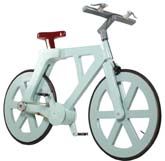×


We have detected your country as:
Please click here to go to the USA website or select another country from the dropdown list.
“Anything that you make out of wood, plastic, or metal can be made out of our material,” Elmish told ISRAEL21c. “Cardboard bikes, wagons, wheelchairs, chairs for airplanes or trains, toys, even cars. We’re not building cars yet. But I say, ‘yet.’ We believe that nothing is impossible and anything is possible.”
An international non-profit organization dedicated to providing free wheelchairs for the disabled in developing nations heard about the cardboard bicycles. Since 2001, the organization—which requested anonymity—has bought 120,000 metal wheelchairs from Chinese manufacturers every year to ship to Africa, at an annual cost of more than $6 million US. “It will cost him a one-time fee of $6 million to build a factory for the production of cardboard wheelchairs in Africa and then almost nothing to produce them,” says Elmish. “He can produce as many wheelchairs as he wants once the factory is running. All we need is access to old car tires, plastic bottle recycling, and cardboard recycling.”
The maintenance-free cardboard wheelchair, weighing eight or nine kilograms (less than 20 pounds), can withstand water and humidity, and can carry riders weighing up to 400 pounds. It is even cheaper and simpler to create than the cardboard bicycle.
 www.cardboardtech.com Making a cardboard bike or wheelchair looks like an exercise in origami with enormous blocks of cardboard. “People look at cardboard as a material that looks like something strong. But the secret is how to make it strong,” says Elmish. “Izhar Gafni developed the theory of how to make it stronger. If you only fold the cardboard it will hold nothing. You need to find ways to give it strength that the regular material doesn’t have.”
www.cardboardtech.com Making a cardboard bike or wheelchair looks like an exercise in origami with enormous blocks of cardboard. “People look at cardboard as a material that looks like something strong. But the secret is how to make it strong,” says Elmish. “Izhar Gafni developed the theory of how to make it stronger. If you only fold the cardboard it will hold nothing. You need to find ways to give it strength that the regular material doesn’t have.”
Several European railroad operators have expressed interest in placing the bikes outside stations as a way of enticing people to continue by bike to their destination. “The whole idea is to take the cars out of the city,” says Elmish.
While naysayers still abound, Elmish says the prototypes have proven their mettle. “There are a lot of smart guys who still say it cannot be done,” he says. “So we’re building a small factory in Israel to show how it’s done.” For more information: http://www.cardboardtech.com
Source: Excerpts of an article by Viva Sarah Press, www.israel21c.org
All logos and trademarks in this site are property of their respective owner. All other materials are property of Bridges for Peace. Copyright © 2025.
Website Site Design by J-Town Internet Services Ltd. - Based in Jerusalem and Serving the World.